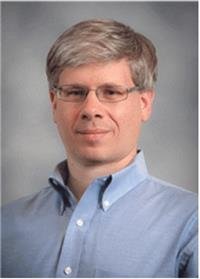Brian Crim is the John M. Turner Chair in the Humanities at Lynchburg College in Lynchburg, Virginia. He finished his M.A. at ODU in 1997, and is the author of Antisemitism in the German Military Community and the Jewish Response, 1914-1938 (Lexington Books, 2014), Our Germans: Project Paperclip and the National Security State (Johns Hopkins University Press, 2018), and other publications.
You have published quite a bit about Germany history, military history, the Holocaust, anti-semitism, and related topics. Looking back, do you think your experience as a student at ODU contributed to this scholarly trajectory?
I came to ODU with an interest in German military history, but it was fairly superficial until I started graduate level work. Carl Boyd's two-semester "Military Thinkers" course was an intensive seminar and the beginning of a more mature approach to these topics. Carl taught me to look beyond tactics and strategy and focus on the socio-cultural dimensions of military history. I decided to research the German officer corps during the Weimar Republic for my thesis and was hooked on the subject. I chose to work with Omer Bartov, then at Rutgers University, during my Ph.D. program and he found real promise in my work at ODU. ODU's program taught me how to write above all else.
What is your recent (2018) book from Johns Hopkins Press about?
Our Germans: Project Paperclip and the National Security State is about the role German scientists played in the emerging military-industrial complex during the Cold War. Project Paperclip was an ambitious and controversial intelligence program targeting German scientists and engineers in avionics, rocketry, chemical weapons, just to name a few. Many Paperclippers were enthusiastic Nazis and prominent figures during the Third Reich. The book examines the fierce debates within the national security bureaucracy over the efficacy and morality of Paperclip; the sordid pasts of some scientist and the degree to which the US intelligence community concealed them; how German scientists contributed to US knowledge of Soviet science; and the legacy of Paperclip in post-Cold War America.
What are you working on right now?
I have an advance contract with Rutgers University Press for a book entitled On Planet Auschwitz: Holocaust Representation in Science Fiction and Horror Film and Television. As an avid consumer of pop culture, I noticed how frequently these genres evoke Holocaust imagery and many do so in profound and substantive ways. I am interested in how Holocaust representation has evolved and why.
What are you enjoying most about the classroom right now? Do you have some favorite topics that you like exploring with your students at Lynchburg College?
Teaching at a smaller school allows me to teach a variety of courses each year. I created the Holocaust course, military history, film and history, and I regularly teach the historical methodology course. I enjoy mentoring students in the researching and writing process. Most majors may not go on to be historians, but writing effectively is a dying art and I want our graduates prepared to enter the workforce as effective communicators.
What do you like about research in Germany?
I wish I could spend more time in Germany, but I love the uniqueness of each region. For example, Berlin is a million miles away from the Black Forest culturally, and even linguistically. I am amazed by the contrast between change and continuity in Germany. I recently visited Peenemünde on the Baltic Coast, the site where the Germans built and launched the V-2 missile. It is a gorgeous resort area now, yet the old testing grounds are still intact.
Have you explored the western part of Virginia quite a bit? What do you enjoy about your area?
I am fortunate to have lived and worked all over Virginia. I went to JMU for my undergraduate degree and ODU for my Masters. I've lived in Arlington, Charlottesville, and now Lynchburg. I love the mountains, trails, and seemingly endless markers highlighting the rich and contested history of the region. Most people know about Monticello, but Jefferson's second home of Poplar Forest is just down the road from my house.




